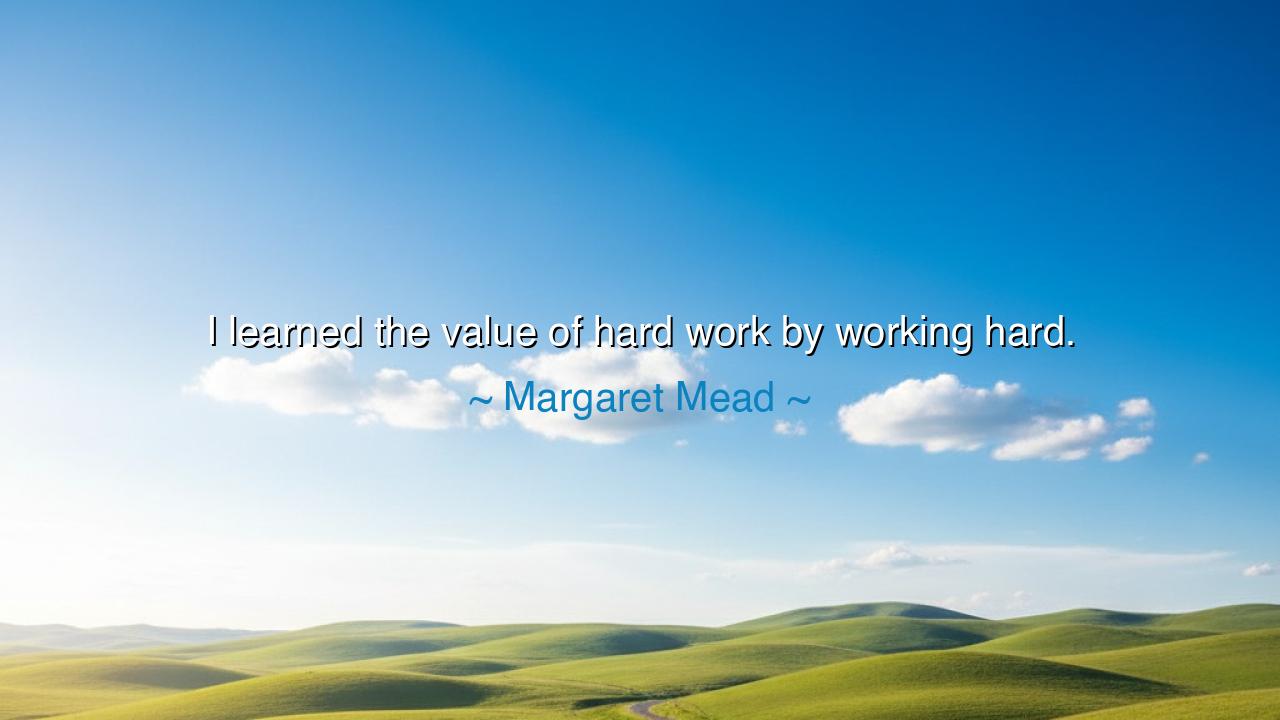
I learned the value of hard work by working hard.






The wise anthropologist Margaret Mead, whose words carried both the grace of intellect and the fire of experience, once declared: “I learned the value of hard work by working hard.” In this simple yet powerful statement, Mead captures one of the most enduring truths of human life—that understanding is not born from theory, but from action; that wisdom cannot be inherited or read, but must be earned through the sweat of effort and the trials of perseverance. Her words are both a confession and a revelation: that to truly know the worth of hard work, one must live it, breathe it, and be shaped by it.
To learn by doing—this is the oldest and most sacred method of mastery. The ancients knew it well. The blacksmith learns the rhythm of the hammer not by listening to another, but by striking the anvil himself. The farmer learns the patience of the seasons by tilling the soil and enduring both harvest and drought. So too does every soul discover the true measure of effort by laboring beyond comfort. Margaret Mead speaks from this eternal law: the value of hard work cannot be taught in words—it must be revealed through labor. For it is only through struggle that the heart grows strong enough to understand the dignity that effort brings.
Mead herself was no stranger to toil. She journeyed across the islands of the South Pacific in an age when few women dared to enter the field of anthropology, studying the lives of distant cultures under harsh conditions. There were no luxuries, no applause, only the endless work of observation, note-taking, and learning from the people she lived among. It was in those years of hardship that she came to understand what she later spoke of: that hard work, though difficult, is not a burden but a blessing. It is the furnace in which purpose is forged. She learned that to give one’s whole self to one’s task—whether in science, art, or life—is the only way to understand its true worth.
There is an ancient mirror to Mead’s truth in the life of Thomas Edison, the great inventor. When asked about his many failed experiments, Edison replied, “I have not failed. I’ve just found 10,000 ways that won’t work.” His brilliance did not emerge from ease or privilege, but from the relentless grind of working hard, day after day, night after night. In his struggle, he learned not only how to create but also how to endure. And through endurance, he found enlightenment. The lesson of both Mead and Edison is the same: the value of labor lies not in what it produces, but in what it makes of the one who labors.
To work hard is to become intimate with truth. It strips away illusions, silences excuses, and teaches humility. The lazy man dreams of greatness but never tastes it; the worker, though weary, discovers the joy of creation, the quiet pride of achievement. The fruit of hard work is not merely success—it is character. Mead’s words remind us that the true reward is not the outcome of the effort, but the transformation that happens within us as we persist. Hard work is the bridge between potential and reality, between desire and fulfillment, between who we are and who we are meant to be.
There is also a spiritual dimension in Mead’s wisdom. To work hard is to enter into harmony with the rhythm of life itself. The universe honors effort; it bends in favor of those who act with purpose and persistence. Just as the seed must break open to grow, the soul must labor to expand. The act of working diligently—of giving oneself wholly to a goal—is a form of prayer, a declaration to existence that says, “I am willing.” And life, in turn, responds to such willingness with growth, opportunity, and revelation.
So let this be your lesson, child of effort and potential: do not flee from hard work, for it is your greatest teacher. Do not seek shortcuts, for they rob you of the wisdom that only struggle can give. Throw yourself fully into whatever task is before you—whether great or small—and in time you will discover what Mead discovered: that the value of hard work lies not only in achievement, but in the awakening of the spirit. The hands that labor in dedication are the hands that shape destiny.
For as Margaret Mead teaches, “I learned the value of hard work by working hard.” There is no other way. To work is to learn, and to learn is to live. In the fire of effort, you will find the gold of understanding; in the weight of labor, you will find the strength of your own soul. And when you have known the worth of what you’ve earned, you will walk this earth with quiet pride, knowing that nothing given lightly was ever worth as much as what you fought to create.






AAdministratorAdministrator
Welcome, honored guests. Please leave a comment, we will respond soon